13 Going On 30: Principles I Learned In Life
As I enter the third decade of my life, I’ve noticed that there are certain principles or ideas that I’m starting to try and live my life by. By no means do I always live up to them, but they provide me with guidance and a framework to help me be successful and fulfilled.
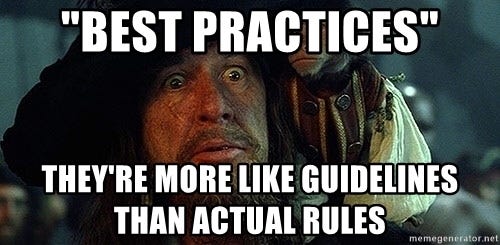
I’m sure they may change in the future as I continue to learn and grow, but at the moment here are my top 13 life principles.
1) Discipline is freedom
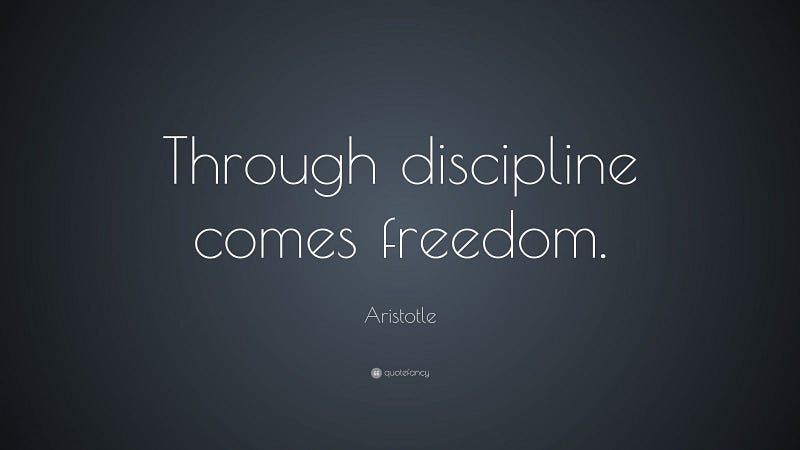
The idea behind the first principle I want to talk about is that no one is free if they are a slave to their own destructive tendencies. Some people think that freedom is just doing what you want, but in actuality, no one can be free as long as they are a slave to their own negative tendencies and lower nature. If you want to be truly free, you have to be able to conquer the things that waste your time and prevent you from doing what you really want. Philosophers have been saying this for millennia (Seneca, Aristotle, Al Ghazali to name a few), but we need a reminder of this in our modern age. Jocko Willink has a concept about this he calls Extreme Ownership: the more discipline you have in your life, the freer you are.
In our society, this mainly pertains to having time and money to focus on your values. How free can someone really be if you are a person that has no time, money or focus to do what they want? Practically this means doing things in the short term that seem to negatively impact your freedom, like waking up early, exercising or saving money, but in the long run those are the things that actually gain you more freedom to focus on what you really want (your higher self or purpose).
2) Low Information Diet
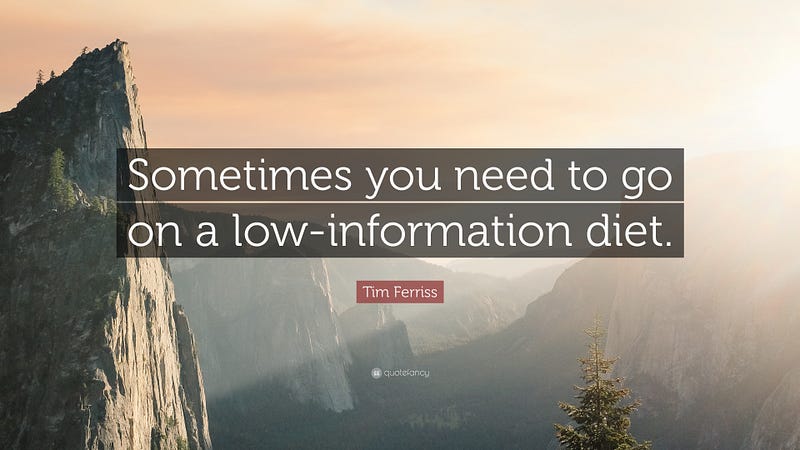
Since in life you have limited resources, you have to always look at the 80/20 principle if you want to maximize the limited amount of time you’re given. This has to do with working within your sphere of control. In a world of endless information, you have to ignore most of it. Sometimes that means rethinking conventional wisdom (going to “first principles” as Elon Musk does), and sometimes it just means that you take in less information.
Having a “low information diet” or “selective ignorance” (taken from Tim Ferriss) actually has a positive effect on your cognitive load (space taken up in your brain). One clear example of this is taken from one of my favorite sections from the first Sherlock Holmes book (A Study in Scarlet) when Dr.Watson is first introduced to the character and he’s taken aback by his intelligence, while at the same time shocked by the fact that he doesn’t know basic facts about the universe and the solar system.
“His ignorance was as remarkable as his knowledge.. My surprise reached a climax, however, when I found incidentally that he was ignorant of the Copernican Theory and of the composition of the Solar System. “To forget it!” “What the deuce is it to me?” he interrupted impatiently; “you say that we go round the sun. If we went round the moon it would not make a pennyworth of difference to me or to my work.”
It reminds me of how in the modern day NBA players like Kyrie Irving and Steph Curry, who at various times said crazy things like the earth is flat and we never went to the moon, can still thrive because their unscientific beliefs have absolutely nothing to do with how skilled they are as basketball players.
Another story I heard on this was how Albert Einstein didn’t even memorize his own phone number since he didn’t want to waste space in his head with information that could be found elsewhere.
On a macro level, I see this play out in the education system and in universities. There is a concept in education known as signaling versus human capital. Bryan Caplan writes extensively in his book The Case Against Education about how higher education (going to college or university) according to his research is about 80% signaling (showing society and employers that you have conscientiousness, intelligence, and conformity) as opposed to only 20% going to human capital (what you actually learn that directly impacts what you do). What I get from this is that so much of what we can learn doesn’t have a direct impact on our lives, so it’s better to just ignore most things that don’t concern you.
3) Hell yeah or no
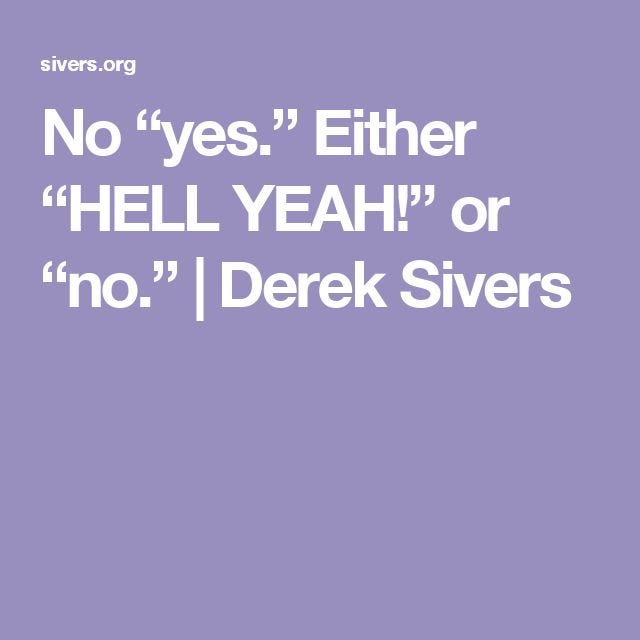
Life is short. You don’t have nearly enough time to do everything you want so you have to make sacrifices. So whenever you’re deciding on what you want to do with your life (especially for very important decisions), you should make the choices be, It’s either a “Hell yes” or “No.” (Derek Sivers writes about this: https://sivers.org/hellyeah). If you can’t decide strongly about something the answer is no.
Warren Buffet also said something similar. The way that he prioritizes is that he takes a list of the top 25 things he wants to do (in life, that week etc.) then highlights the top 5. The other 20 are his avoid at all cost list because the opportunity cost is too high, it will distract him from his top priorities.
Part of this process is constantly refocusing what you’re working on to take out things in your life that are sucking your time and effort and aren’t your priorities. People fall under a trap where they initially have to say yes to opportunities in order to succeed. However, once they start succeeding in something (getting traction in that endeavor), more opportunities appear, which dilutes their focus and has them succeed less, which then leads then to take more opportunities to overcorrect, and the cycle continues.
Greg McKeown mentions how this consists of 4 phases:
“Phase 1: When we really have clarity of purpose, it leads to success.
Phase 2: When we have success, it leads to more options and opportunities.
Phase 3: When we have increased options and opportunities, it leads to diffused efforts.
Phase 4: Diffused efforts undermine the very clarity that led to our success in the first place”
What then needs to be done is constant refocusing and saying no to new opportunities that don’t follow under your focus so you avoid this cycle.
4) Taking Action

There are not many things within our sphere of control. However, the things that we do have some power over (through our community, society, family, and friends), it is our duty to take action on them. It’s very easy to be a critic of something, but to actually take action takes guts.
“It is not the critic who counts; not the man who points out how the strong man stumbles, or where the doer of deeds could have done them better. The credit belongs to the man who is actually in the arena, whose face is marred by dust and sweat and blood; who strives valiantly; who errs, who comes short again and again, because there is no effort without error and shortcoming; but who does actually strive to do the deeds; who knows great enthusiasms, the great devotions; who spends himself in a worthy cause; who at the best knows in the end the triumph of high achievement, and who at the worst, if he fails, at least fails while daring greatly, so that his place shall never be with those cold and timid souls who neither know victory nor defeat. ” – Theodore Roosevelt
In some cases, I believe that if something is within your sphere of control and you can make a positive difference but don’t take action, it’s evil.
5) No one deserves your respect
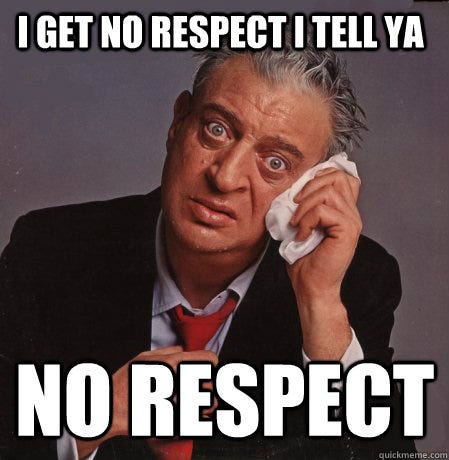
No one in this world deserves your respect. I’m not saying that you shouldn’t respect anyone, but that respect is something that is earned not deserved. There is no human on this earth that you are obligated to respect unless they respect you. This is the same standard I give onto others. I respect them, and I want to be respected back. No one in the world deserves your respect unless they respect you.
6) Dunning–Kruger effect
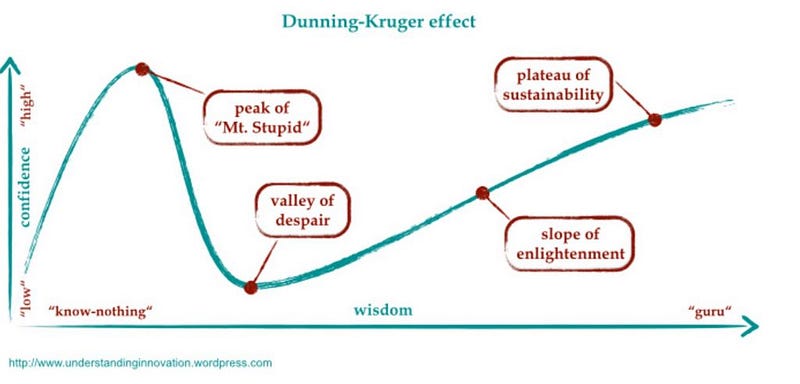
The idea behind the Dunning-Kruger effect is that people that have the most confidence in something are often the ones that know the least about it. That’s why you should always be wary of people with too much confidence because the majority of them actually know almost nothing about what they’re talking about.
“The fundamental cause of the trouble is that in the modern world the stupid are cocksure while the intelligent are full of doubt.” — Bertrand Russel
If you should apply this principle to yourself, you should be wary about your own beliefs as well. You need to keep reminding yourself of how little you know and ask yourself if you want are willing to abandon your beliefs if you realize they are no longer true. One clear-cut example of this that I often see in our society is how many people have strong opinions about human evolution, while most people believe that it’s “just a theory” despite the vast amount of evidence that proves that human evolution is a fact, even more so than the theory of gravity (tangentially related, read my book review on the book Sapiens here).
If you value truth, it’s something that you have to constantly examine, to make sure you aren’t falling into a bubble of your own knowledge and cognitive dissonance.
7) Choose your company wisely
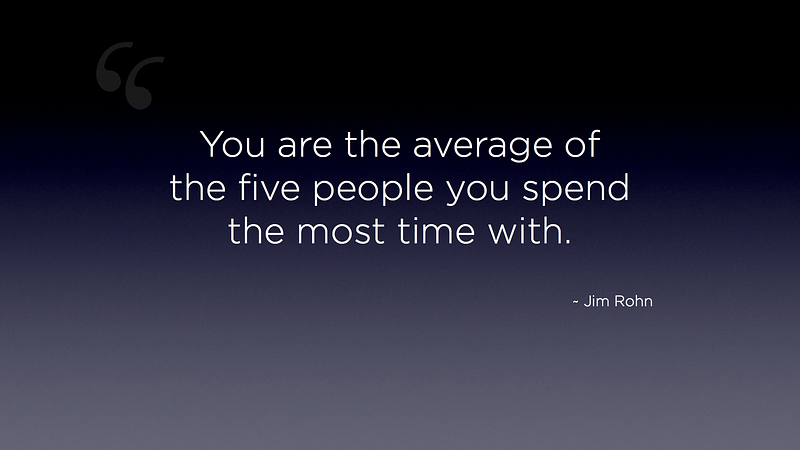
You are the average of 5 people you hang out with. Spend quality time with those that are positive in your life. One way to choose these people is to find people who are either working towards or are already at a level that you want to be at.
Besides just choosing people to be around that are in line with your long term goals, another way for me to choose my company is when I hang out with someone I see how I feel after I leave them. If I feel better, I want to spend more time with them. If I feel worse, I avoid them. I like the saying taken from the Islamic tradition “The likeness of a righteous friend and an evil friend, is the likeness of a perfume seller and a blacksmith. As for the perfume seller, he may either bestow something on you, or you may purchase something from him, or you may benefit from his sweet smell. And as for the blacksmith, he may either burn your clothes, or you may be exposed to his awful smell.”
8) Use systems not goals
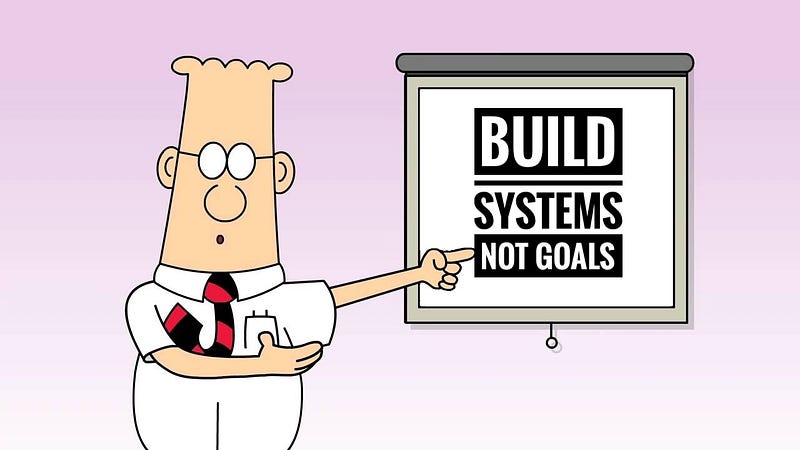
This is taken from Scott Adams. The idea behind this is that you want to put yourself in situations that no matter what happens, you end up succeeding and pushing things forward in your life. He goes in detail on this topic in his book How to Fail at Almost Everything and Still Win Big.
If you only define goals in your life, you have 2 things that could happen. Either you accomplish the goal or you don’t. If you do accomplish the goal, you’re often left with a feeling of “what now” as you did what you wanted and you need a new goal to motivate yourself again. If you didn’t manage to accomplish the goal, which could be for a number of reasons (changing priorities, interest, circumstances etc.), you also didn’t gain anything besides feeling that you failed.
However, if you think about things in terms of systems it’s a lot different. Instead of having a set goal, if you just have a system in place where even if you don’t accomplish your initial goal, the system pushes you forward. For example, instead of having a goal to lose weight, you could have a system to start a healthier lifestyle (by building healthier habits) which is a lot more sustainable.
Instead of having a goal to get a certain job, have a system in place that takes your career forward (as you might not want that job in the future), this could be done by immersing yourself in the field you’re interested in, getting to know people and learning the inner working of the career you want. That way, in the future, you might decide that you want that job, or that you want to do something completely different, like going after a tangential role or starting a business.
Another benefit of systems that builds on top of this, is the idea of forming a talent stack (also taken from Scott Adams), which is basically how you can build out multiple skills in various fields through the systems you build in your life, which while you aren’t necessarily the best in the world at each one of the skills, combined you have a set of skills that are very unique and valuable.
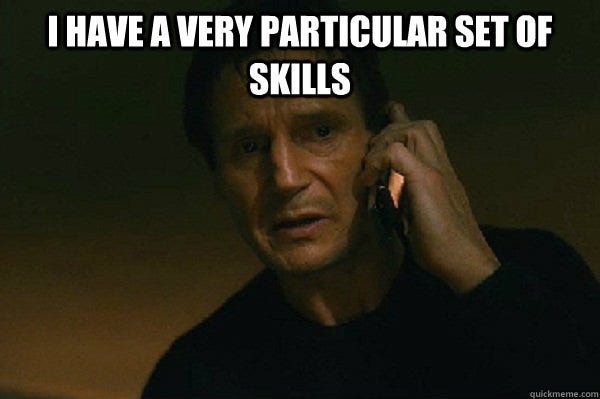
When I first graduated from university, I took a similar approach. I studied Computer Engineering and got into the field of marketing. That built a system where I gained a unique set of skills or talent stack, which had a positive effect on my career (being a technical person that can both program and do marketing, got me into Digital Marketing and Analytics). I then moved to another role, in which I added Education and Training on top of that. Now I have an even more unique set of skills (programming, digital marketing, and training), which while I may not be the best in the world at any of them on their own, together they are a great combination.
9) Measure to improve

As the famous executive author Peter Drucker famously said, “That which is measured, improves”. It’s something that I found works well for me. If I want to change a habit or pattern of behavior, I measure it. Whether that be eating habits, finances, learning, reading or anything else. The more that you hold yourself accountable for things, the more control you have over long terms outcomes. 3 examples of this that have helped me immensely in this are: 1) A todo tracker for what I’m working on (I use Kanban Flow) 2) A finance app to keep track of my spending and saving (I use Wallet) and 3) An app to keep track of my habits to help me work on things everything (reading, writing, exercise, coding and more, I use Habit Bull for this).
10) Activation Energy (the do something principle)
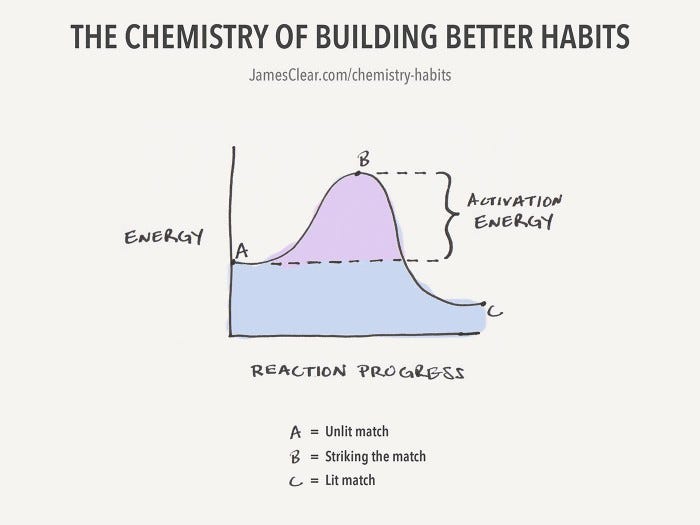
Willpower is limited. This is taken from both Scott Adams as well as from James Clear who talks about how the hardest part of starting something is the beginning. Once you start something (a habit or any deep work-related activity), the friction is greatly reduced once you get past the initial hurdle of getting started.
If you want to build a positive habit in your life, it’s a lot better to automate things in such a way that the choices you have to make to extend that habit are reduced. For example, if you want to become a writer, the hardest part is opening up an empty word document, once it’s open the initial friction disappears, and it’s a lot easier to build a habit out of it.
11) Compounding effects of positive change
James Clear in his book Atomic Habits mentions how a 1% improvement a day leads to a 37x improvement over the course of a year. However, this can be hard to see, and in the moment can be disheartening.
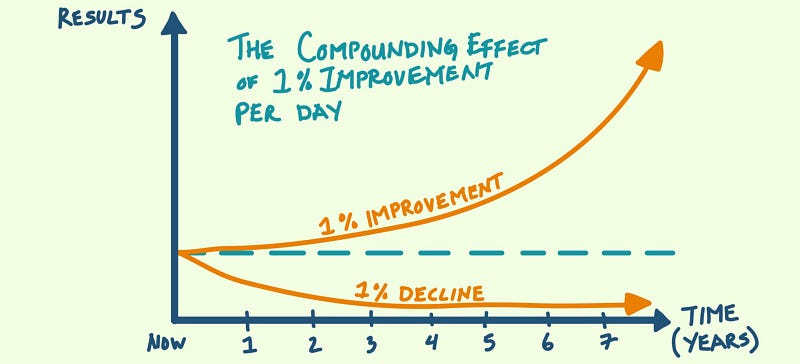
A nice metaphor about the positive compounding effects of habits is how when an ice cube goes from -4°C to -2 °C you don’t see any difference. However, only once it reaches 0°C does it start to melt. Were those other changes in degrees useless? Even though they seemed to have no effect at the time, it was a build up of those changes that helped cause the melting and not just the change from -1°C to 0°C.
12) Trust the process
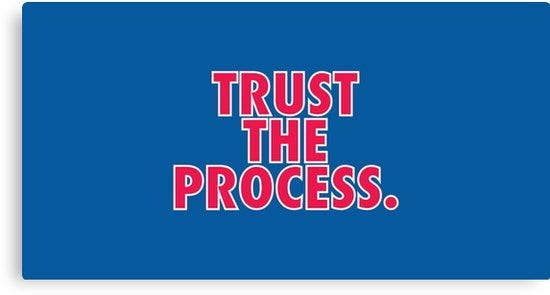
I realized that in order to have a large impact, I need to be able to keep at things and trust the process of what I’m doing. Great things take time. Working in a startup environment, one of the biggest things I noticed is that people often try to rush things. I know many people that try to live by the “move fast and break things” rule. While I think that’s the way to go when it comes to startups, projects and testing out features, to build something of impact it takes time. Probably years.
I like the “1000 day rule” (taken from Tropical MBA, mainly talking about becoming a solopreneur), which states that “in order to achieve the same level of income from a full-time job as you’re making in your business (while working on a bootstrapped side business), on average it takes around 1,000 days”. That’s about 3 years. Of course, it’s just an estimate and your mileage may vary, but the point is that working towards something big takes time, especially if you want it to be lasting and sustainable.
This is true for relationships as well. If you look at marriage for example, the easy part is the honeymoon or beginning period. However, if you want to build a lasting sustainable relationship, you have to work at it every day, making compromises and improving for each other over months and years.
13) Never Stop Learning
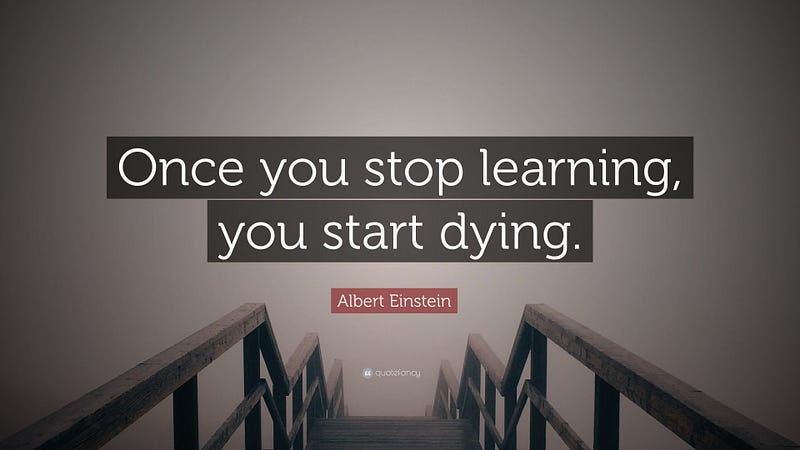
This is my final, and to me, probably my most important principle in life “Never stop learning”. No matter who you are, how smart you are, or how much you know, you are ignorant on 99.999% (I had to round down) of all the knowledge in the world.
“There are known knowns; there are things we know we know. We also know there are known unknowns; that is to say we know there are some things we do not know. But there are also unknown unknowns — the ones we don’t know we don’t know.” Donald Rumsfeld
(disclaimer: I don’t support his hawkish views, I just like this quote)

What do you think of these principles? Let me know if there are any that you try and live by.

I loved this. A lot of these are things that I’ve read, come across or learnt over time and then forgotten about. It was great to ‘re-learn’ them by reading through this post. Great job, and thanks for taking the time to put it together for others!
Thanks Komail! That’s exactly why I wanted to write them down, to remind myself and others. Really glad you found it beneficial.
This was really great, Ahmad. A lot of value and very little fluff. I enjoyed your succinct and thoughtful reflections!